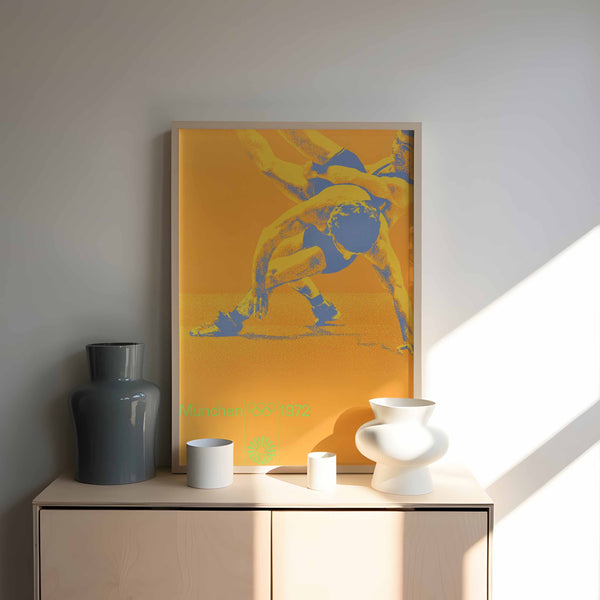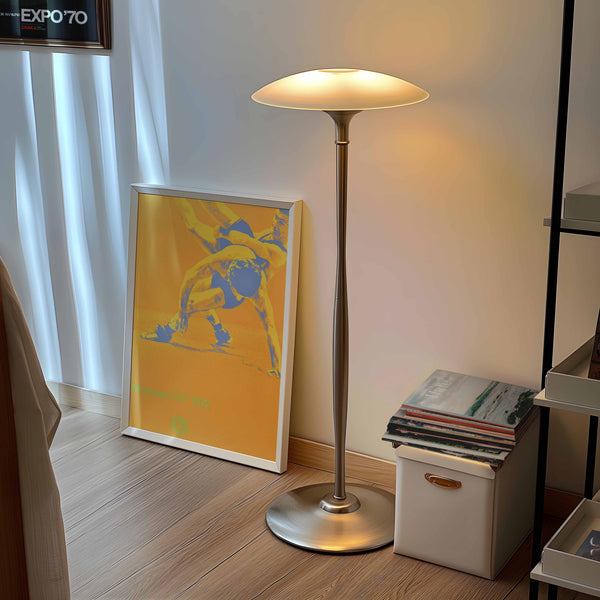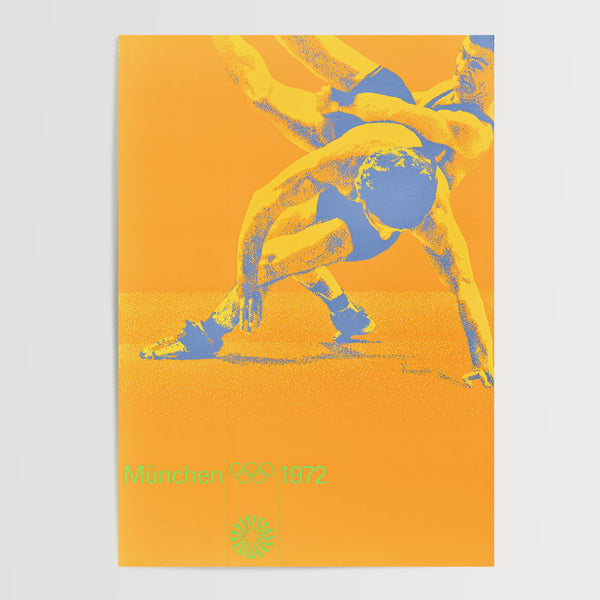
Wrestling – Munich Olympics | 1972
Tax included
Premium 200gsm Paper
200gsm (80lb) Paper Stock | Choice of Matte or Semi-Gloss Finish
Worldwide Shipping
Produced and shipped worldwide from our network of global hubs
Wrestling - Munich 1972, by Otl Aicher
This striking official poster for the 1972 Munich Olympics depicts two stylised wrestlers rendered in vibrant colours against a bold orange background. The image employs a distinctive posterization technique where a photographic action shot of wrestling competition has been transformed into simplified blocks of blue and yellow. Two wrestlers are shown in dynamic confrontation—one figure is bent forward with arms extended while a second figure is positioned in a grappling stance. Their bodies create an abstract, almost sculptural composition that captures the intense physical interaction central to the sport of wrestling. The simplified forms maintain the essential movement and tension of the athletes while reducing them to their most graphic elements. At the bottom of the poster, in mint green text, appears "München" alongside the Olympic rings logo and the year "1972", with a stylised sunburst motif beneath that serves as the official Games emblem.
The poster was part of an innovative and comprehensive visual identity programme for the 1972 Munich Olympic Games, designed by renowned German graphic designer Otl Aicher and his Department XI team. Wrestling featured prominently in these Games, with competition held at the purpose-built Fairgrounds Hall (Messe München), where 388 athletes from 49 nations competed across 20 events in both Greco-Roman and freestyle disciplines. The USSR dominated the wrestling events, winning multiple gold medals including Zagalav Abdulbekov's victory in the freestyle 57kg category. American Dan Gable achieved a remarkable feat by winning gold without having a single point scored against him throughout the competition—the only wrestler in Olympic history to accomplish this. The 1972 Olympics were tragically marred by the Munich Massacre, when Palestinian terrorists took 11 Israeli team members hostage on September 5th, all of whom were killed along with a German police officer, temporarily halting all competitions before they resumed after a memorial service.
Otl Aicher (1922-1991) was one of Germany's most influential graphic designers of the 20th century. His principled opposition to Nazi ideology shaped his lifelong commitment to democratic design, leading to his arrest in 1937 for refusing to join the Hitler Youth. After the war, he co-founded the influential Ulm School of Design in 1953 with his wife Inge Scholl, whose siblings Hans and Sophie were executed for their resistance activities with the White Rose movement.
We've carefully remastered this print to make it available for you to enjoy. Our restoration process is detailed and precise but, because this artwork was never created digitally and no original digital file exists, some slight imperfections may remain when viewed up close, including some slightly blurred edges. To preserve its quality, we only offer it in sizes up to A2. Please do check the final product photo carefully and ensure you're happy before purchasing.
Shipping
We provide fast, secure, and affordable shipping worldwide through our network of over 60 logistics partners. You can calculate your estimated shipping cost and delivery time on our Shipping Page.
Returns
We’re a small business, and every item is printed just for you. Because of this, we’re unable to accept returns if you change your mind or if the address provided at checkout was incorrect.
If your order doesn’t arrive, arrives damaged, or you receive the wrong item, we’ll make it right by offering a refund or replacement.
You can read our full Refund Policy here.
Sizing
Our prints are available in three standard A-series sizes:
- A4 (21 x 29.7 cm / 8.3 x 11.7 in)
- A3 (29.7 x 42 cm / 11.7 x 16.5 in)
- A2 (42 x 59.4 cm / 16.5 x 23.4 in)
About the artist
Your choice of materials
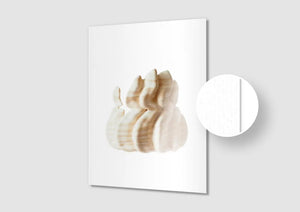
Premium Semi-Gloss Paper
Our premium semi-gloss paper features a subtle sheen, vibrant and consistent colour reproduction, and excellent durability with fade resistance. Ideal for prints with heavy ink coverage, it has a weight of 200gsm (80lb) and is made from FSC-certified or equivalent raw materials.
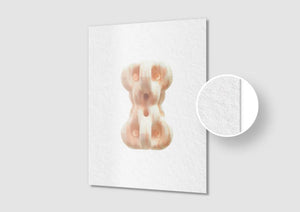
Premium Matte Paper
Our premium matte paper offers a smooth, non-reflective, and luxurious finish with a soft touch. Its ink-absorbent nature can sometimes create a subtle, mottled effect. It has a weight of 200gsm (80lb) and is made from FSC-certified or equivalent sustainable materials.

Natural Pine Frames
Our wooden poster frames are made from durable natural pine wood and come ready to hang. The frames measure 23mm thick by 12mm wide and feature art-quality, shatterproof plexiglass to ensure safe shipping (no glass). Remember to peel off the protective film before you hang!

